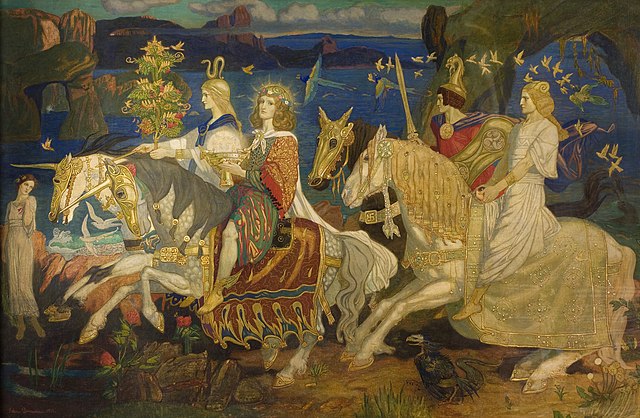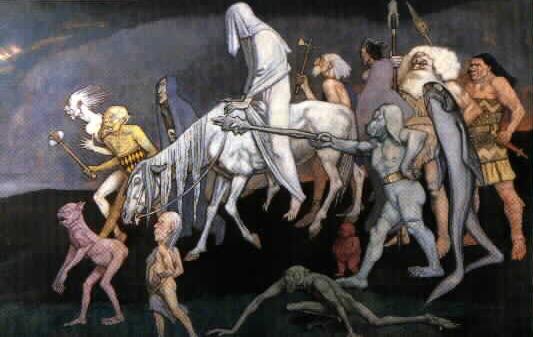The Disgraced Ruler: How Bres Lost His Throne
Irish mythology is full of fascinating figures and stories. One of the most intriguing characters is Bres, a king who belongs to two rival supernatural races. In this post, we’ll look at Bres’s origins, his brief time on the throne, and his story’s lessons for us today.
Table of Contents
Bres of Two Worlds
Bres is a central figure in Irish myth, often called both beautiful and controversial. He ruled the Tuatha Dé Danann, a supernatural people famed for their magical abilities. Still, he was also connected by blood to their enemies, the Fomorians. His story is a cautionary tale of how a leader’s failings can bring their own downfall.
The Tuatha Dé Danann

The Tuatha Dé Danann are sometimes described as god-like inhabitants of Ireland. They possessed extraordinary powers and introduced many arts and skills to the land. They are often seen as protectors of nature and are deeply woven into Ireland’s mythic history.
The Fomorians
In contrast, the Fomorians are frequently portrayed as chaotic or monstrous beings who represent the darker forces of nature. Conflicts between the Tuatha Dé Danann and the Fomorians appear in many Irish tales, creating a rich tapestry of mythological battles and power struggles.
Bres’s Ancestry and Early Life
Bres’s parents came from these two opposing worlds. His father, King Elatha, was a prominent Fomorian leader. His mother was part of the Tuatha Dé Danann (different sources give different names for her). Growing up with such a mixed heritage meant Bres was destined to be significant—he embodied both the Tuatha Dé Danann’s bright magic and the Fomorians’ darker side.
Ascension to the Throne

When Nuadu, the rightful king of the Tuatha Dé Danann, lost his arm in battle, he was considered “blemished” and thus unfit to rule according to ancient tradition. The Tuatha Dé Danann chose Bres to be their king, mostly because he was renowned for his physical beauty and had a family link to them through his mother.
Reign and Failings
Despite his impressive appearance, Bres proved himself to be an unworthy ruler. In Irish tradition, a king was expected to provide hospitality and generosity. Bres failed in both respects:
- Lack of Hospitality: He did not host feasts or share his wealth with his people, a primary social responsibility in early Irish culture.
- Imposition of Tributes: He heavily taxed the Tuatha Dé Danann and favoured his Fomorian relatives. This caused growing resentment among his subjects.
The final blow to Bres’s reputation came when Cairbre, a respected poet, composed a satire against him. In Irish lore, satire was believed to have real power and could cause physical blemishes. This poetic curse marked the beginning of Bres’s loss of status.
Downfall and Aftermath
Seeing Bres’s failings, the Tuatha Dé Danann deposed him and restored Nuadu, who by then had a silver arm (and later, a fully functional replacement) to overcome his earlier disqualification.
Seeking revenge, Bres joined forces with the Fomorians against the Tuatha Dé Danann. This led to the Second Battle of Mag Tuired, a major conflict in Irish mythology. Ultimately, Bres was captured, and to spare his own life, he offered to teach important agricultural practices—such as ploughing, sowing, and reaping—so that Ireland would thrive. This knowledge was highly valued, showcasing how, even in defeat, he could still offer something of worth.
A Mythic Bridge
As a figure who was both Tuatha Dé Danann and Fomorian, Bres symbolises a bridge between creation and destruction, between the civilised and the wild. His life echoes the theme of balance—how a ruler or leader must serve all their people equally.
Bres is widely discussed in Celtic studies and remains popular for those interested in Irish mythology. His story underlines how deeply the Irish valued hospitality, fairness, and the power of the spoken (or, in this case, sung) word.
Conclusion
Bres’s story vividly portrays a leader who rose quickly but lacked the generosity and fairness his position demanded. He serves as a timeless warning: leadership is not just about lineage or good looks; it’s about fulfilling obligations and respecting those who look to you for guidance.
By delving into Bres’s tale, we also glimpse the broader mythological world of the Tuatha Dé Danann and the Fomorians. It’s a reminder of how ancient myths can still speak to us today about responsibility, the importance of community, and the consequences of failing to honour our commitments.
Thank you for reading!
If you enjoyed learning about Bres, consider exploring more about Irish mythology and the Tuatha Dé Danann to discover an entire realm of wonder, magic, and valuable life lessons.
Book Recommendations:
- Gods and Fighting Men by Lady Augusta Gregory (1904)
- Early Irish Myths and Sagas, translated by Jeffery Gantz (Penguin Classics)
- A Dictionary of Celtic Mythology by James MacKillop (Oxford University Press)
